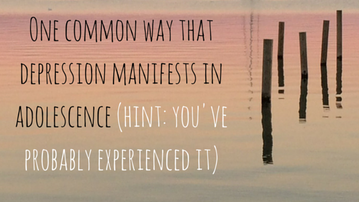
Specifically, I want to talk about depression and acting out. We've heard the expression "my kid is acting out" many times but what does it really mean and how does it relate to depression? Let's keep going.
As I explain in detail in a blog post on What does acting out mean and what can you do to help?,
acting out is your child's way of trying to communicate or express something through action that is impossible to communicate through words; their unique way of trying to cope with thoughts, feelings or experiences that are overwhelming to them.
What are some behaviors that adolescents may do in an attempt to feel better that may be the result of underlying feelings of depression? We can divide them into two general categories: behaviors that express aggression towards others and behaviors that express aggression towards oneself.
Aggression towards others can be:
1) verbal aggression towards others:
- yelling,
- screaming,
- verbal abuse - being generally mean-spirited, offensive and even
- bullying others explicitly or implicitly through online interaction and social media,
- frequent arguments with friends and family members
2) physical aggression towards others:
- kicking, biting (usually for small children)
- hitting,
- getting into fights,
- throwing objects at others
- threatening violence or intimidating others
Aggression towards the self is a bit more subtle and requires that adults pay close attention to what's happening with their teen. Aggression towards the self manifests itself in the following behaviors but is certainly not limited to them:
- self-injuring
- drinking or abusing drugs
- sexually promiscuous behavior
- self-sabotage by not caring for academic performance, for example
- putting oneself in potentially dangerous situations:
- staying up late at night,
- communicating with older people online,
- engaging in sexually charged conversations online, sexting, etc.
- getting involved in abusive relationships with others
The best way to try and understand what may be going on with you or your teen is to consult a professional, where in psychoanalytic psychotherapy, together, you can begin to decipher the meaning of what's going on and hopefully feel better as a result. For the rest of you, I hope this post sheds some light on the most common way that depression manifests itself in adolescent, namely through acting out.
If you have any thoughts or questions, please, leave me a comment in the comment section below or write me an email. I'd be happy to talk more about it.
For more articles on common mental health issues affecting you and your family, subscribe to Mental Health Digest and get the latest issue emailed to you today by leaving your name and email address in the contact form here.
You may also like:
Parenting children with special needs: The 1 intervention you can't afford to neglect.
What does acting out mean and what can you do to help?
Attention deficit hyperactivity disorder: How to support your anxious child.
Depression in Adolescence: 5 Insights Every Parent Needs to Know



 RSS Feed
RSS Feed